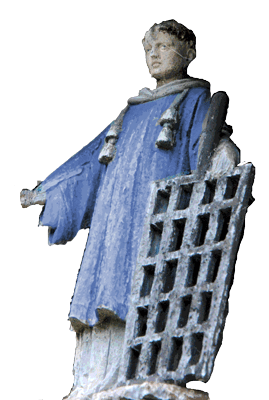
Welcome to St Laurence Church, Appleton with Besselsleigh
A welcoming and inclusive church serving the whole community

Welcome to St Laurence Church, Appleton with Besselsleigh
A welcoming and inclusive church serving the whole community
Evensong Readings: Psalm 91, II Kings 6.8-17; Revelation 5 We have crossed the Rubicon of the autumnal equinox, and entered that quarter of the year in which darkness deepens, and thick pullovers emerge from bottom-drawers. To mark this change of season, the Church has for many centuries kept a number of feast-days, beginning with Saint Michael (tomorrow, on 29 September), Raphael in late October, and All Saints and All Souls at the start of November. These celebrations offer pools of light amid the encircling gloom, leading us on towards the promise of Advent and the joyful fulfilment of Christmas. Angels are offered to us to act as guardians and protectors in difficult circumstances. As tonight’s Psalm puts it, ‘He shall give his angels charge over thee, to keep thee in all thy ways.’ In the first lesson (from the Second Book of Kings), the Lord surrounds the prophet Elisha with a defensive ring of horses-and-chariots of fire against the Arameans. It reminds us that, throughout the scriptures, Saint Michael has an essentially military role, most famously when war breaks out in heaven, and Michael defeats the dragon, which plummets to earth, to be conquered afresh by the blood of the Lamb, and by the faithful testimony of the churches. Thus the persecuted first Christians were drawn into the eternal war on wickedness; a war in which we too, albeit more modestly, are surely engaged. But the angels have other functions. Raphael is famously a healer, restoring the sight of Tobit in the apocryphal book of that name. Gabriel is heaven’s pre-eminent postman, bringing to Mary the Good news of Salvation. Other angels, unnamed, contribute important symbols to the tapestry of the Christian landscape. A septet of trumpet-playing angels in the Book of Revelation sounds the imminent return of Christ as Judge; while still others receive the prayers of the Church, offer them at the altar of heaven, then transform them into bowls filled full of the wrath of God, and hurled to the earth; where, in this re-run of the Plagues of Egypt, those who persecute the Church, like those who persecuted the Hebrews, suffer sores and blood, darkness and drought, hailstones and scorching fire. ‘And they gnaw their tongues in agony, and curse the God of heaven.’ Exciting stuff though this is, by far the most important work of the angels (like the work of humans) is to worship God. In Revelation, one of the most vivid images (as we heard just now) is the worship of the Lamb by saints and angels, and by those faithful souls who have endured the persecutions of Empire, and now reap the reward of eternal life. Recognisable to many through Handel’s Messiah, these great hymns of praise teach us our theology, inspire our worship, and sustain our life of faith. Christ, the spotless Passover sacrifice, is worshipped and adored as the combined voices of heaven and earth sing ‘Worthy is the Lamb that was slain to receive … honour and glory and blessing.’ It’s like the scene in Isaiah 6, in which he too is granted a vision of celestial worship: the heavenly temple shakes, is filled with the smoke of incense and the voluminous hem of the divine robe; and the six-winged seraphim fly around God’s throne, singing an unceasing Sanctus: ‘Holy, holy, holy, is the Lord of hosts: the whole earth is full of his glory.’ We sing this great chorus whenever we attend the Eucharist, and accept the invitation to ‘laud and magnify’ God’s glorious name. But the Prayer Book reminds us also that it is our ‘bounden duty’ to thank God at all times and in all places. That is the phrase that best sums up our response to the angels, and the call of Christ. It is true that, unlike Elisha, we probably won’t ever see the full angelic power of heaven’s cavalry, yet we are nonetheless promised that we might entertain angels unawares. Perhaps indeed we do recall a time when, out of nowhere, a stranger turned up to save us in our hour of need. Or perhaps we ourselves were the angel, used by God in a brief moment of saving grace? In any event, it is by a constant recollection of the worship of heaven, and by the addition of our inner voices to it, that we most fully live in the love and light of God. Not only in our own prayer and worship, but in all our tasks and encounters; and in all that each day presents us with, we yield ourselves every moment to the eternal praises of heaven. These songs of angels become the music that plays within us; in which we join at all times and in all places. And as long as there is love in our hearts and breath in our bodies, we will know the God whom we adore, and in whom we find the only life worthy of the name.
